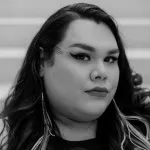A Poetry Mixtape Edited by Joshua Whitehead
Joshua's Liner Notes
A mixtape is a symbol of joy—as much as the receiver of a telephone, when slammed, is one of rage. My first mixtape was full of angst: the black parade[1], everybody’s fool[2], cat and mouse[3]. Nowadays my mixtape might have titles like: 1. Why do you speak to me of human decency, 2. I want to touch the thorax of god, 3. I dare you to entomb me, and 4. I am elegiac. Perhaps this mixtape is of regression, into childhood, into wombstates, into embryonic cosmology; perhaps it too is of futurism, into stardust, into incomprehensibility, a terrarium blooming in a sawed-off jaw. I might hear the distinct, but indecipherable, voices of my parents hushed voices speaking upon the backdrop of a Kitty Wells song and me, in the backseat of their car, lulled into a peace I may never know again. I am forever seeking that.
I think of Eve Kosofsky Sedgwick, a theorist of queer affect and literary criticism, who called for reparative reading over paranoid reading. What she means is we ought to read not as paranoid voyeurs looking for a misplaced em dash or a flicker of human violence to highlight and respond to, to eat that toxic pea—how exhausting the endeavour to not only live in the maw, but to actively seek its teeth in worlds beyond the one we already inhabit; but rather, to read as reparative kinsfolk, to find the grandeur in the miniscule, a wormhole to ghost ourselves into futurity, or an abandoned junkyard filled with radical reinvention. I think of Sedgwick often, I thought of her in the curation of this mixtape: of how reparative reading can make way for reparative writing.
I think back to a land acknowledgement I heard during Calgary Pride 2022 and listen to the acknowledger orate, “We thank Indigenous peoples for sacrificing themselves.” I am wearing a red-hand medallion[4], beaded Two-Spirit pride flag earrings, and I am here for community—a refuge from the heteronormative, capitalistic, settler colonial apocalypse reigning down beyond the doors of this establishment. And I dissipate outside of history. Queer and trans Indigeneity, here, and globally, are often thought of as objects of curiosity, salves to colonial ideologies of queerness that so desperately seek historical validation on lands they thought conquered to plant rainbow flags upon stolen lands, we become tonics, potions, relics to be skinned and adorned. Décor. I become a tool of poetics for political legitimacy.
It’s a miracle, really, that we have not succumbed to hate but are vast reservoirs of joy, know that.
As an Indigenous person (Oji-Cree) from Treaty 1 (Peguis First Nation), living in Treaty 7 (Mohkinstsis/Calgary) I ask myself continually: how am I being a good guest here? How am I becoming a good ancestor for my kin? And as a writer and a reader I ask: how can I be a good guest to the oratories of my communities (to which I am both native and guest to)? I think, for now, my answer is: I must be a reparative reader and practice reparative writing. I must come to the page and see it too as sovereign, respect its peoplehood(s) and nationhood(s), its cultural boundaries and protocols, its pluralities, in the same way(s) I do the land. Because what’s funny is: story always finds you when you need it. Perhaps it’s akin to the medicines I’ve been taught how to harvest, in that, we only take what we need so as never to disturb the root and offer back to it with something of equal or greater value (not in the economic sense but in the utilitarian value to its overall wellbeing), so that, when I need medicine once more, it’s bloomed again. The page is full and its boughs heavy.
The writers here are viciously joyful even when tethered to a state that seeks to destroy them. The poems are all by Indigenous (including global Indigeneity: Maori and Gadigal) queer peoples who are active practitioners of joy and futurity in my literary archives. They teach me that there is order in the disordered, that there are ancestors in the cosmos, and that the non-human are living kin we are accountable to too: the river, my sister. They have shown me that as much as we are ghosted out of our bodies and stories—there is radical freedom in embodying ghastliness because it makes one unknowable and untranslatable to forces that seek to ruin. I am shown that if we are to unmoor ourselves from the endstop of history that settler colonialism and heteropatriarchy have adopted us as, we are queer enough to spindle that period into a comma. I am taught of the communal effort to transform policy into politic, grammar into rhetoric, and by god, what beautiful metaphors we have yet to become.
[1] My Chemical Romance
[2] Evanescence
[3] Red Jumpsuit Apparatus
[4] A political symbol of MMIWG2S (Missing and Murdered Indigenous Women, Girls, and Two-Spirit)
The Poems
Recommended reading
Music
Jeremy Dutcher (Wolastoqiyik): https://www.youtube.com/watch?v=6pDRpDjrBZE
Shawnee Kish (Mohawk): https://www.youtube.com/watch?v=req90Gi-IBc
Angel Baribeau (Cree): https://www.youtube.com/watch?v=7b6oiUGpu-0
Cris Derksen (Cree): https://www.youtube.com/watch?v=d-6jjXB3Tyk
Ziibiwan Mahgagahbow (Anishinaabe): https://soundcloud.com/ZIIBIWAN
Melody McKiver (Anishinaabe): https://www.melodymckiver.com/
Edzi’u (Tahltan, Tlingit): https://www.edziumusic.com/
Fontine (Cree): https://www.youtube.com/playlist?list=OLAK5uy_kpeTIk-Zg95kJLaNa6Jgntxg4P14dqzEs\
Niya (Lakota/Dakota Sioux, Cree): https://open.spotify.com/artist/0pSABcT7D2HKC9oRXZvZH8?si=9M4AxMyeSsSmmol9xYZx9w&utm_medium=share&utm_source=linktree&nd=1
Black Belt Eagle Scout (Swinomish/Iñupiaq): https://www.blackbelteaglescout.com/
Seth Cardinal DodgingHorse/Lawrence Teeth (Blackfoot): https://lawrenceteeth.bandcamp.com/
Art
Kent Monkman (Cree): https://www.kentmonkman.com/
Arielle Twist (Cree): https://arielletwist.com/
Lehuauakea (Kanaka Maoli): https://lehuauakea.com/
Aedan Corey (Inuk): uviluqbydesign.ca
Film & TV:
Two Hard Things, Two Soft Things (Dir. Mark Kenneth Woods and Michael Yerxa): https://www.youtube.com/watch?v=gd56h-xAlsg
Aviliaq: Entwined (Dir. Alethea Amaquq-Baril): https://www.youtube.com/watch?v=7dKqe7sScEo&t=130s
First Stories: Two-Spirit (Dir. Sharon A. Desjarlais): https://www.nfb.ca/film/first_stories_two_spirited/
Second Stories: Debwewin Gekenamaan, Our Place in the Circle (Dir. Lorne Olson):
https://www.nfb.ca/film/second_stories_-our_place_in_the_circle/
Wildhood (Dir. Bretten Hannam): https://www.youtube.com/watch?v=bpq5vqx70nY
Fire Song (Dir. Adam Garnet Jones): https://www.youtube.com/watch?v=1HyRNI9kKkA
Reservation Dogs’ S2E04 “Mabel” (Written by Kawennáhere Devery Jacobs & Sterlin Harjo)
Theo Cuthand (Cree): tjcuthand.com
Dillan Chiblow (Anishinaabe): https://dillanchiblow.com/
Beadwork:
@beadsbysho
Jordy Ironstar (Nakoda Oyaté): @beadingbyironstar
Jori Brennon: @joribrennon
@hunter_the_trapper
@indicity
Becki Jones (Diné): @moongrrl666
Cory Hunlin (Tsilhqot’in): @thisclaw
Suiitaaki (Blackfoot): @rezinbabe
Mel Beaulieu (Mi’kmaw): @the.beads.knees
Nalakwsis (Eeyou): @nalakwsis
Bailey Macabre (Cree): @cedarsageskoden
Health:
Native Youth Sexual Health Network (NYSHN): https://www.nativeyouthsexualhealth.com/
Fashion:
Evan Ducharme (Métis): https://www.evanducharme.com/
Riley Kucheran: @rskucheran
Scott Wabano (Cree): https://scottwabano.com/
Christian Allaire (Anishinaabe) The Power of Style
Literature:
Kōtuku Titihuia Nuttall (Coast Salish/Māori) Tauhou
Demian DinéYazhi (Diné): https://www.etsy.com/ca/listing/1077597857/we-left-them-nothing
Joseph M. Pierce (Cherokee): https://www.josephmpierce.com/
Chrystos (Menominee) Not Vanishing
Beth Brant (Degonwadonti) Writing as Witness
Beverly Little Thunder (Lakota) One Bead at a Time
Deborah Miranda (Esselen and Chumash): Bad Indians
Tomson Highway (Cree) Kiss of the Fur Queen
Sharron Proulx-Turner (Métis): She Walks for Days Inside a Thousand Eyes
Gregory Scofield (Métis) Witness, I Am
Daniel Heath Justice (Cherokee) Why Indigenous Literatures Matter
Craig Womack (Creek-Cherokee) Drowning in Fire
Rain Prud’homme-Cranford (Louisiana Creole) Miscegenation Rounddance: Poèmes Historiques
Gin Sexsmith (Tyendinaga Mohawk) In the Hands of Men
Smokii Sumac (Ktunaxa) You are Enough: Love Poems for the End of the World
T’ancháy Redvers (Dene and Métis)
Jas Morgan (Cree-Métis-Saulteaux) nîtisânak
Alex Wilson (Cree) & Marie Laing (Kanyen’kehá:ka) Queering Indigenous Education
Ma-Nee Chacaby (Ojibwe-Cree): A Two-Spirit Journey: The Autobiography of an Ojibwa-Cree Elder
Darcie Little Badger (Lipan Apache) Elatsoe
Nathan Adler (Anishinaabe) Ghost Lake
Drag:
Continental Breakfast: @contibreakfast
Ilona Verley (Nlaka’pamux): @ilonaverley
Persephone Estradiol (Oji-Cree): @persephone_estradiol
Xana (Métis): @xanasrevenge
Jaylene Tyme (Cree, Saulteaux, Métis): @jaylenetyme
2SQT Education:
Myra Laramee (Cree): https://www.youtube.com/watch?v=Eu4xNUq2hGE
Ma-Nee Chacaby (Oji-Cree): https://www.youtube.com/watch?v=juzpocOX5ik
Geo Neptune (Passamaquoddy): https://www.youtube.com/watch?v=pc7fY_Z3sHM






